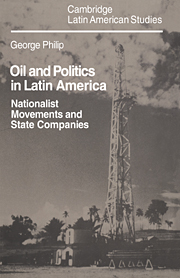Book contents
- Frontmatter
- Contents
- List of tables
- Preface
- Glossary
- Abbreviations
- Note on currencies and other units of measurement
- Maps: Latin America in 1920, 1940, 1960 and 1981; showing importing countries, exporting countries and countries self-sufficient in oil
- Introduction: The politics of oil in twentieth-century Latin America
- Part I The world oil environment
- 1 The corporate ascendancy 1890–1927
- 2 Retrenchment and concentration 1928–41
- 3 The making of the post-war oil world 1942–55
- 4 The major companies in retreat 1955–70
- 5 The oil market revolution and its consequences for Latin America 1971–9
- 6 Latin America in the twentieth-century oil system
- Part II The major expropriations
- Part III The state oil companies
- Notes and bibliography
- Index
- CAMBRIDGE LATIN AMERICAN STUDIES
5 - The oil market revolution and its consequences for Latin America 1971–9
Published online by Cambridge University Press: 23 December 2009
- Frontmatter
- Contents
- List of tables
- Preface
- Glossary
- Abbreviations
- Note on currencies and other units of measurement
- Maps: Latin America in 1920, 1940, 1960 and 1981; showing importing countries, exporting countries and countries self-sufficient in oil
- Introduction: The politics of oil in twentieth-century Latin America
- Part I The world oil environment
- 1 The corporate ascendancy 1890–1927
- 2 Retrenchment and concentration 1928–41
- 3 The making of the post-war oil world 1942–55
- 4 The major companies in retreat 1955–70
- 5 The oil market revolution and its consequences for Latin America 1971–9
- 6 Latin America in the twentieth-century oil system
- Part II The major expropriations
- Part III The state oil companies
- Notes and bibliography
- Index
- CAMBRIDGE LATIN AMERICAN STUDIES
Summary
The 1970s saw a fundamental shift of power over oil markets from the oil companies and their home governments to the most important producer governments. Oil prices increased sharply, ownership of oil passed from the oil companies to the host governments and key members of opec began to take effective responsibility for the level of world oil production. On the other side of the same coin, there was clear loss of influence on the part of the USA and a massive transfer of income from the importers of oil to the exporters. This transformation was also largely (although not solely) responsible for a general slowdown in the rate of economic growth in the OECD countries after 1973, which was reflected in slackening demand for oil and oil products. Nevertheless, with little effective substitution for oil, the balance of market power was not greatly altered by world recession, although at the end of the decade Mexico was emerging as a new world supplier on a significant scale. Over all, the fundamental market strength of the main opec countries appeared more and more evident as the decade went on, and the effect of this transformation upon Latin America was very marked indeed.
Latin America's oil exporters
Venezuela was one of the main beneficiaries of this oil market revolution. As can be seen in table 5.1, export prices and income increased sharply in the 1970–4 period, despite the fact that the volume of crude oil production actually fell.
- Type
- Chapter
- Information
- Oil and Politics in Latin AmericaNationalist Movements and State Companies, pp. 114 - 143Publisher: Cambridge University PressPrint publication year: 1982



